

ADR Lawyer Los Angeles
ADR Lawyer Los Angeles, CA Advanced Dispute Resolution
ADR-Mediation-Arbitration. Handling an ADR dispute isn't an easy chore.

On the contrary, it's one of the most tedious and daunting chores. During the mediation process, you're likely to lose most of the points. Perhaps, you've to stay content with minimal compensation. Maybe, you enjoy a better settlement but lose the other party's confidence. All such situations could take a heavy toll on your life. To avoid any such scene, you need persistent support. He could come up with a much better settlement idea that's acceptable to both parties. ADR-Mediation-Arbitration. Bank Guarantees and Arbitration: Resisting a Wrongful Call? Bank Guarantees are a common feature of international construction contracts.
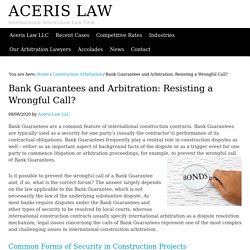
Bank Guarantees are typically used as a security for one party’s (usually the contractor’s) performance of its contractual obligations. Bank Guarantees frequently play a central role in construction disputes as well – either as an important aspect of background facts of the dispute or as a trigger event for one party to commence litigation or arbitration proceedings, for example, to prevent the wrongful call of Bank Guarantees. Is it possible to prevent the wrongful call of a Bank Guarantee and, if so, what is the correct forum? The answer largely depends on the law applicable to the Bank Guarantee, which is not necessarily the law of the underlying substantive dispute. Aceris Law Wins Third-Party Funded Arbitration. Aceris Law is pleased to announce that it has won another arbitration, this time funded by a third-party funder, with its client receiving payment of all amounts awarded, minus the portion to be paid to the third-party funder.
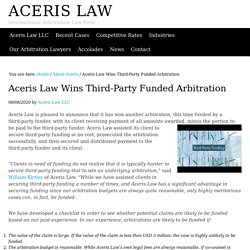
Aceris Law assisted its client to secure third-party funding at no cost, prosecuted the arbitration successfully, and then secured and distributed payment to the third-party funder and its client. “Clients in need of funding do not realize that it is typically harder to secure third-party funding that to win an underlying arbitration,” said William Kirtley of Aceris Law. “While we have assisted clients in securing third-party funding a number of times, and Aceris Law has a significant advantage in securing funding since our arbitration budgets are always quite reasonable, only highly meritorious cases can, in fact, be funded. We have developed a checklist in order to see whether potential claims are likely to be funded based on our past experience. Arbitration in Japan. Introduction Loree Reinsurance and Arbitration Law Forum. Introduction We’ve seen how the Federal Arbitration Act authorizes confirmation and enforcement of various domestic and foreign arbitration awards falling within its scope.
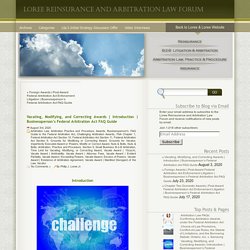
(See here, here, here, and here.) Let’s look at what the Federal Arbitration Act has to say about vacating, modifying, or correcting awards. International-arbitration-attorney. It is common in investment arbitration that investors seek to recover the profits they claim to have lost as a consequence of one or more internationally wrongful acts perpetrated by a host State of foreign investment.
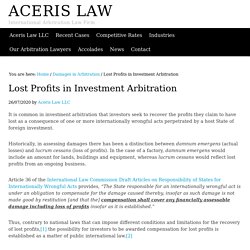
Historically, in assessing damages there has been a distinction between damnum emergens (actual losses) and lucrum cessans (loss of profits). In the case of a factory, damnum emergens would include an amount for lands, buildings and equipment, whereas lucrum cessans would reflect lost profits from an ongoing business. Article 36 of the International Law Commission Draft Articles on Responsibility of States for Internationally Wrongful Acts provides, “The State responsible for an internationally wrongful act is under an obligation to compensate for the damage caused thereby, insofar as such damage is not made good by restitution [and that the] compensation shall cover any financially assessable damage including loss of profits insofar as it is established.” 269. . [1] J. FAA Sections 9 and 207 Loree Reinsurance and Arbitration Law Forum. In previous segments (here, here, here, and here) we discussed the confirmation of Chapter One Domestic Awards and Chapter Two Domestic Awards.
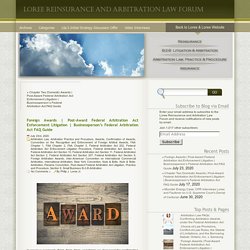
This segment addresses foreign awards. There are two types of foreign awards that are or may be governed by the Federal Arbitration Act: (a) awards made in the territory of a country that is a signatory to the Convention on the Recognition and Enforcement of Foreign Arbitral Awards (the “New York Convention” or “Convention”), the Inter-American Convention on International Commercial Arbitration (the “Panama Convention”), or both, which we refer to as Chapter Two Foreign Awards; and (b) awards that are made outside the United States in a country that is not a signatory to the New York or Panama Conventions, which we refer to as Chapter One Foreign Awards.
What are Chapter Two Foreign Awards? The New York Convention applies to awards made in the territory of a signatory state. What are Chapter One Foreign Awards? Please note. . . ADR-Mediation-Arbitration. International-arbitration-attorney. In international arbitration, consent to arbitration can be expressed in different forms, including in domestic laws.
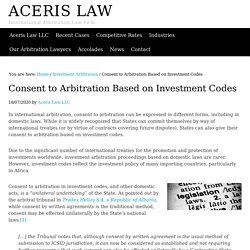
While it is widely recognized that States can commit themselves by way of international treaties (or by virtue of contracts covering future disputes), States can also give their consent to arbitration based on investment codes. Due to the significant number of international treaties for the promotion and protection of investments worldwide, investment arbitration proceedings based on domestic laws are rarer.
However, investment codes reflect the investment policy of many importing countries, particularly in Africa. Consent to arbitration in investment codes, and other domestic acts, is a “unilateral undertaking” of the State. As pointed out by the arbitral tribunal in Tradex Hellas S.A. v Republic of Albania, while consent by written agreements is the traditional method, consent may be effected unilaterally by the State’s national laws.[1] Article 13.